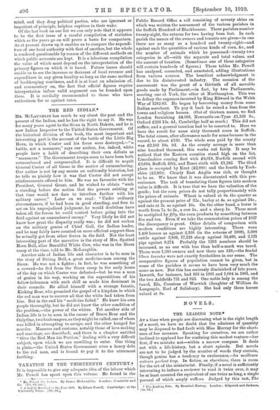THE RED INDIAN.* MR. MeLkuGHLIN has much to say about
the past and the present of the Indian, and he has the right to say it. He was for many years agent to the Sioux in North Dakota, and he is now Indian Inspector to the United States Government. Of the historical division of the book, the most important and interesting part is the account of the battle of the Little Big Horn, in which Custer and his force were destroyed,—" a battle, not a massacre," says our author, for, indeed, white people have a habit of describing their own defeats as "massacres." The Government troops seem to have been both outnumbered and outgeneralled. It is difficult to acquit General Custer of all blame in the matter of outnumbering. Our author is not by any means an unfriendly historian, but he tells us plainly how it was that Custer did not accept reinforcements offered to him. He was no favourite with the President, General Grant, and he wished to obtain "such a standing before the nation that the powers existing at that time would not dare to interfere further with his military career." Later on we read : " Under ordinary circumstances, if he had been in good standing, and free to act on his unprejudiced judgment, he would doubtless have taken all the forces he could control before going into the field against an unnumbered enemy." Very likely he did not know how great the disparity really was ; he did not reckon on the military genius of Chief Gall, the Indian leader, and he may fairly have counted on more efficient support than he actually got from other forces in the field. Not the least interesting part of the narrative is the story of Mrs. Spotted Horn Bull, alias Beautiful White Cow, who was in the Sioux camp at the time, told to Mr. McLaughlin.
Another side of Indian life and character is to be seen in the story of Sitting Bull, a great medicine-man among the Sioux. He was not a fighter ; in fact, he was something of a coward—he fled from the Sioux camp in the early hours of the day on which Custer was defeated—but he was a man of genius in his way, working on the superstitions of his fellow-tribesmen with such skill as made him dominant in their councils. He allied himself with a strange fanatic, Kicking Bear, who preached the gospel of a kingdom in which the red man was to recover all that the white had taken from him. But in the end his " medicine failed." He knew his own
people thoroughly, but he did not know the other condition of the problem,—the power of the whites. Yet another side of Indian life is to be seen in the career of Brave Bear and the Only One, two bushrangers, as they might be called, one of whom was killed in attempting to escape, and the other hanged for murder. Manners and customs, notably those of love-making and marriage, are described; and there is a chapter entitled " Give the Red Man his Portion," dealing with a very difficult subject, upon which we are unwilling to enter. One thing is plain,—the United States Government owes a heavy debt to the red man, and is bound to pay it to the uttermost farthing.






































 Previous page
Previous page